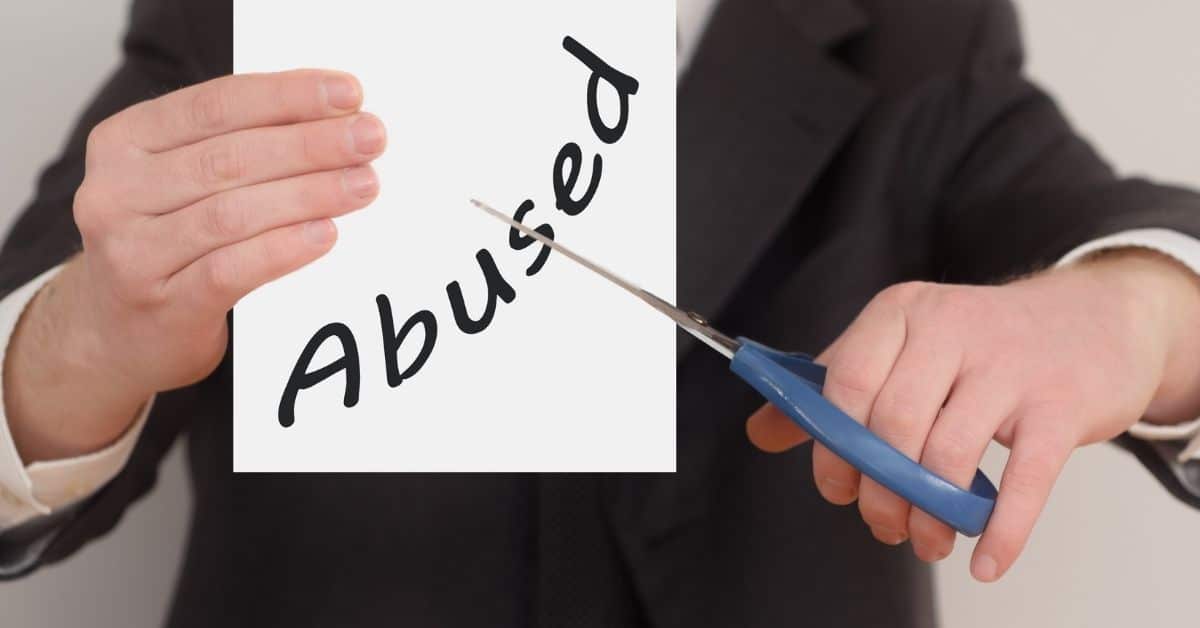Reviewed by Karis A. Williams, MSMHC, LPC, December 1, 2023
Victims of narcissism are usually buried under years of abuse that they most likely never recognized as such. They endlessly attempt to be a better person themselves. Surely, if they do a better job, the other person will finally recognize them. If they love them better, the narcissist will finally love them back. If they speak more gracefully, the narcissist’s words will become less biting. But unfortunately, all of those methods of improvement only increase the abuse heaped on them. But when the victim goes to the church for help and the church doesn’t recognize narcissistic abuse, the abuse is actually made even worse.
To be clear, not all churches fall into the category of not recognizing narcissistic abuse. There are some churches that have done an amazing job recognizing and dealing with narcissistic abuse. But unfortunately, for many churches, this is not the case.
So, what do you do when the church doesn’t recognize narcissistic abuse? The first course of action is to find a counselor/counseling agency that understands and has experience with narcissistic issues. Next, you need that agency to be willing to work with your church leadership to bring healing in the best way to all involved. Then you need to make sure you have documentation to show what is going on where nobody can see. Finally, you need to address the church leadership in a way that does not put them on the defensive as much as encourage them to see what the real issues are.
I would like to take a look at each of the steps above more in depth, but first, let’s look at WHY the church does not always recognize narcissistic abuse.
Table of Contents
Why the Church Doesn’t Recognize Narcissistic Abuse
There are many reasons why the church at large is unable or unwilling to recognize narcissistic abuse. One article will not be able to cover all of the reasons adequately. But this can get us started, and hopefully help us to know how to help churches who struggle in this area in some life-changing ways. Let’s take a look at a few of them.
The Church Perceives Narcissism as Godliness
The spiritual narcissist loves to put on a good show, just like his secular counterpart. But what takes a spiritual narcissist one step further is his claim (verbal or otherwise) that he is on equal par with God, or has a direct line to Him that the rest of us just don’t have or can’t see. This can appear as super spirituality or godliness above and beyond the rest of the congregation.
Narcissists in church tend to say and do things that seem hugely giving and sacrificial. And it is hard to see that as anything but godliness upon first glance. Why would we ever think someone’s motives could be so askew, especially when doing the work of God? And to heap even more confusion on an already confusing situation, why would a narcissist do these things when he should know that God knows his very heart and motives?
The simple answer is that when we are alongside these people in the church we tend to have an elevated sense of trust. Because we are all Christians, we feel that we are on the same journey toward the same goal: sanctification and eternity serving God in Heaven. It never occurs to us that the motivation could be anything else. Then, when doubt creeps in, we chide ourselves for being so judgmental.
The Church Wants Both Partners to be Equally Wrong
There is a vein of church counseling that very loudly proclaims that when two people are in conflict, it has to be the fault of both individuals, because we are all sinners and incapable of perfection. This perspective emerges even more in church marital counseling. I will wholeheartedly agree with the fact that we are all sinners. But to put the onus equally on both partners in the case of narcissism causes a burden that weighs too heavily on the victim and gives the narcissist more room to continue to abuse.

This was the case in my own counseling by my church. I was blessed to be working with a Christian counseling agency as well that did have an excellent understanding of narcissism and how it affects the spouse and children. And I was fortunate to have both my church and counselors willing to work side by side. This proved instrumental in the church being able to see the narcissism emerge. Once my ex-husband couldn’t keep his public and private life compartmentalized, the narcissism came out like a roaring lion.
My pastor still very much wanted to keep both parties equally responsible. I think he did this mostly because his training as a pastor emphasized it so strongly. But my counselors saw this view and there were times that my primary counselor went to bat for me above and beyond.
The Church Only Sees the Public Persona of a Narcissist
The spiritual narcissist can do some pretty amazing things in the church. He can be a dynamic leader. He can even be a great servant. His words can be full of humility and grace. Until he was behind closed doors and he had a chance to show what was behind the mask.
Even then, most Christians afford grace to others when sinned against. That defines the Christian way–the golden rule is to treat others as you would like to be treated. It isn’t wrong to overlook the difficult issues in order to see the good of people.
I think about how it took me 27 years to see and understand what my ex was doing to us. That only emerged through counseling. If it takes that long and we lived with him and experienced his narcissistic battle behind closed doors for so many years, how much harder would it be for the church membership and leadership to see it in such a limited form? It was easier for them to retain the picture they saw of the narcissist as a loving servant of God.
The Church Leadership Could be Narcissistic
Sometimes, it just comes down to the leadership of the church being narcissistic and working in tandem with the narcissist member(s). Unfortunately, narcissist religious leaders are not uncommon. Here are a few reasons for this:
- People trust without questioning a church leader because they are supposed to be more godly and moral than society at large.
- We have all heard the phrase, “absolute power corrupts absolutely.” Unfortunately, this holds just as true in Christian circles as in secular.
- Pastors tend to be charismatic and charming, people oriented, persuasive. This is a hallmark of narcissists drawing people in.
- Narcissists like to be seen as heroes, saving others. Pastors’ job descriptions include helping those that are suffering or in need.
- Pastors have access to people’s private lives, making them immensely vulnerable. Narcissists take advantage of that, knowing that people won’t be willing to out narcissistic abuse in private matters.

Glenn Ball and Darrell Puls researched pastors in 2013 that revealed that 31% of the pastors they surveyed were on the narcissism spectrum. That is pretty scary to think about in an industry where trust is paramount. You can read more about that in Darrell Puls’ book, Let Us Prey: The Plague of Narcissist Pastors and What We Can Do About It.
Church Leadership May Consider the Narcissist too Valuable
If the narcissist church member gives money, time, or authority, the church leadership could consider him to be too valuable to excommunicate from the church, regardless of the chaos he could be causing behind the scenes. This is so unfortunate for the victims who go to church leadership and get shut down because the church considers the narcissist’s contributions as more important than the life and safety of the victim.
Church Leaders May Fear a Bad Reputation for Handling Narcissistic Abuse Differently Than Other Churches
Most churches in America are weighed down with a patriarchal authority structure that allows husbands to do whatever they see fit without any accountability to speak of. Wives are expected to submit, often without questioning. When this scenario causes issues, women are told to submit more and men are told to get control of their household. This is so incredibly detrimental to family life and safety of women and children that find themselves in this position.
If a church that is part of a larger denomination speaks out against the cultural status quo of their denomination, they can face backlack from the higher level leadership as well as their peers. The cycle of refusal to stop abuse never ends. And the victims don’t find safety in the one place in the world they should see as a haven.
So now that we can see some reasons why the church fails to recognize narcissistic abuse, let’s take a look at what we can do about it.
4 Healthy Steps to Take When the Church Doesn’t Recognize Narcissistic Abuse
These are the primary things that you will want to make sure about when you are preparing to get out from under narcissistic abuse. Whether that means trying to repair the relationship with the narcissist, getting a divorce, or trying to co-parent with a narcissist after separation or divorce, you must remain level-headed. It is an unfair standard on the surface. But when church leaders see your ability to remain balanced, your request for help will be taken so much more seriously. Let’s take a closer look at each of these steps.
Find Counseling That is Experienced in Narcissism
You will want to find a Christian counselor. Then they will be able to understand your issues with regard to a Christian home and the church. It is critical to find a counselor that understands narcissism. If they don’t, the narcissist will waste valuable time sucking them into his web of chaos. And the narcissist will use that time to destroy those that put him in that vulnerable position to start with.

When the counselors can see what is going on more quickly, you can start the healing process immediately. Also, a Christian counselor will be able to link psychological issues with Biblical concepts and terminology. That will help to get the church on board much more quickly with the right steps to healing. And that brings us to the next step.
Make Sure Your Counseling Agency is Willing to Work With Your Church Leadership
When your counselor or counseling agency works with your church leadership, your whole world will change. The narcissist won’t be able to work in separate bubbles anymore. His separate worlds of abuser and God’s right-hand man will change in an instant.
Unfortunately, that generally results in the narcissist spiraling out of control very quickly. In my case, my ex became very angry with everyone that he saw as “on my side.” He couldn’t (or wouldn’t) acknowledge that his healing would be beneficial to him as well as his family, work, church life, and any other relationships he had along the way.
I was also fortunate that my counselors warned me and my church before this happened so we could be prepared. As hard as it was, it was easier than if it had happened without the support that I had in place.
Make Sure You Have Documentation So Your Helpers Can See What is Really Happening
This was an easy step for me. I was rarely speaking with my ex by the time we started counseling. I was so beaten up verbally for any little thing I said that I just stopped talking. My ex loved the silence. So when all contact went to text and email, it was an easy way to prove the control and abuse he was still lording over our household.
As he sent back abusive texts and emails, all I needed to do was pass them along to the church and the counselors. I also sent copies of my texts and emails so they could see the whole picture. I did this even when it wasn’t shiny and beautiful on my side. It allowed them to see that I was truly trying to work through this in a healthy way. And over time, my communications became less reactive to him and more emotionally healthy. That was a nice by-product of this step!
Address the Church Leaders Regarding Narcissistic Difficulties in an Encouraging Way
There will be times that you, your counselors, and your church leadership will not all be in agreement. Lashing out in anger (even though you are so incredibly frustrated and on your last nerve) is never productive and will never work to get them to see your perspective more clearly. Although I did do that a couple of times and quickly got the attention of my pastor (he knew me well enough that in order for me to get to that point that something was seriously bothering me), the real progress was not made until we sat down and talked the issue through in a calm and civilized manner. I think miraculous amounts of progress were made in those talks with the pastor and his wife regarding where my heart really was and what was really happening in our home.
And after some time, the church leadership did have a full understanding of what my ex was doing to his family.
As for the heated exchanges with my pastor, he was gracious enough to later joke about my fiery email that got his full attention. I pray that you all have such a pastor that is willing to admit that he didn’t have the full picture and do what it takes to get there in a gracious way.
Conclusion
I hope that this article helps you to be able to get to a healthy place with your church. But there are some churches that will never come to an understanding of what is really happening to you. They will never see the Scriptures that talk about how to handle narcissism (for an expanded article on what the Bible says about narcissism, click here). In those cases, it may be necessary for you to find a church that will help you find a road to physical, emotional, and spiritual health.
Did your experience look the same or different from mine? I would love to hear your story. Feel free to comment below, but if you are not in a safe place, don’t use your real name! Do what you need to to stay safe.
Recommended Reading
If you would like to go deeper into this subject, there are the two books I would highly recommend. The first one was life changing for me in how I worked with my church leadership. I actually bought a copy for my pastor to keep for future reference. The second one is equally is good, but I read it much later in my journey, so it didn’t have quite the same effect as the first. Both are excellent books!
I hope you find as much value in these books as I did!
If you liked this article, I think you will love the following articles as well:
Will the Church Support Divorcing a Narcissist?
Are Narcissists Demon Possessed?
What Does the Bible Say About Narcissism?
Can a Spiritual Narcissist Heal?
- How to Choose the Best Attorney When Divorcing a Narcissist - March 23, 2024
- Why Won’t God Heal my Narcissist? - February 28, 2024
- How Narcissists Use Religion to Control and Manipulate You - December 26, 2023







